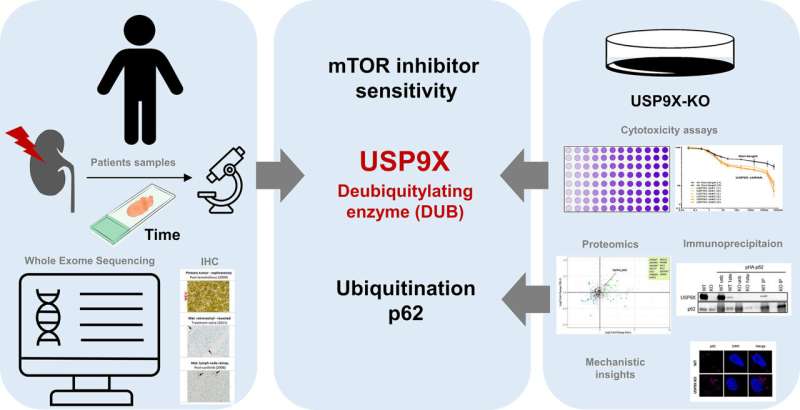This article has been reviewed according to Science X's editorial process and policies. Editors have highlighted the following attributes while ensuring the content's credibility:
fact-checked
trusted source
proofread
How a patient with kidney cancer overcame several metastases against all expectations

15 years ago, a woman in her thirties was diagnosed with metastatic kidney cancer. The oncologist José Pablo Maroto, from the Hospital de la Santa Creu i Sant Pau, in Barcelona, decided to treat her with the drug temsirolimus, which worked much better than expected. The patient beat the cancer. Nine years later, bone metastasis was detected, but temsirolimus was once again effective.
Now, thanks to the generosity and tenacity of this patient, and the collaboration between her oncologist and researchers from the National Cancer Research Centre (CNIO), we know why temsirolimus proved so effective in this case and in that of two other patients. This finding will allow clinicians to identify other kidney cancer patients for whom temsirolimus will likely be the ideal treatment. At the moment, drugs like temsirolimus—so-called mTOR inhibitors—are only used when others have failed.
"Currently, drugs within the temsirolimus family are not usually the first option in kidney cancer, but this result indicates that in some very specific patients, they should be because they work so well. We now know how to identify these patients," says Cristina Rodríguez-Antona, a researcher with CNIO's Human Cancer Genetics program.
Funded by charity fun runs
Rodríguez-Antona, Maroto and other researchers and oncologists from CNIO and the Hospital de la Santa Creu i Sant Pau have now published this finding in the International Journal of Cancer, in a paper with Juan María Roldán-Romero as first author.
The research has been financed in part with money raised from charity fun runs promoted by the patient and organized by the A 4 el KM Athletics Club in Les Franqueses del Valles.
"We are so proud of this publication," says Maroto. "It's a collaboration between an association that organizes charity fun runs every year to raise money for kidney cancer research; patients who agree to give samples in difficult times; and basic and clinical researchers. The ultimate goal is to find out why this treatment worked so well. This is not the first time we have posed this question, but it is one of the first cases in which we have obtained a clear answer."
Finding this answer has taken years. The researchers had to find more cases similar to those of the first patient. The team from Sant Pau selected the subjects and sent their samples to CNIO, where they were analyzed in depth.
Mutations in a protein involved in autophagy
The key is some very rare mutations in the USP9X protein, which regulates cellular processes critical for tumor growth. Roldán-Romero's research shows that these mutations override the function of USP9X, and when that happens the cell does not recycle its waste properly and dies. Temsirolimus acts on a different molecular pathway but has a similar effect; in patients in whom USP9X does not work, the impact of this drug is enhanced.
Rodríguez-Antona explains, "To understand the effect of USP9X mutations, we developed cell models and did proteomic assays that indicated that tumor cells without USP9X had an alteration in cell autophagy [the process by which the cell recycles its waste products]. Temsirolimus also alters autophagy, which causes a synergistic effect, making tumors respond better to this treatment."
A new therapeutic target
In addition to identifying other patients with USP9X mutations, who may benefit from treatment with drugs such as temsirolimus, this finding supports the development of new UPS9X inhibitor drugs as an innovative therapeutic strategy.
"A compound that overrides the function of UPS9X would have a synergistic effect with temsirolimus, increasing its anti-tumor efficacy," says Rodríguez-Antona.
The authors of the study offer one final message: "Translational studies are complex because they require close collaboration between clinicians and basic researchers. In addition, patients play a major role in donating their samples at a very difficult time. This study of rare tumors was made possible thanks to the generosity of the patients, whose samples are the basis of all the subsequent molecular work and who promoted the study since its inception."
More information: Juan M. Roldán‐Romero et al, Deubiquitinase USP9X loss sensitizes renal cancer cells to mTOR inhibition, International Journal of Cancer (2023). DOI: 10.1002/ijc.34575




















